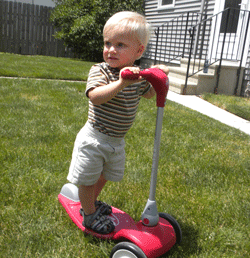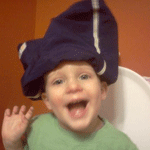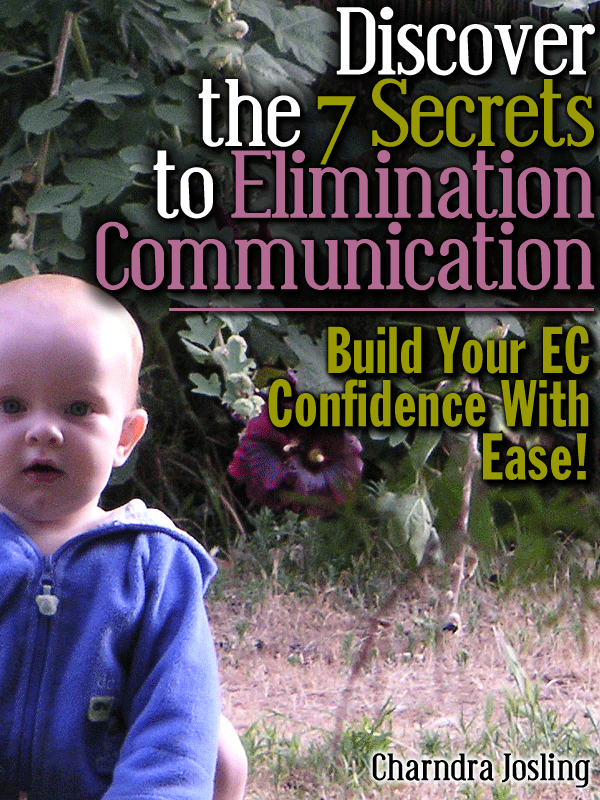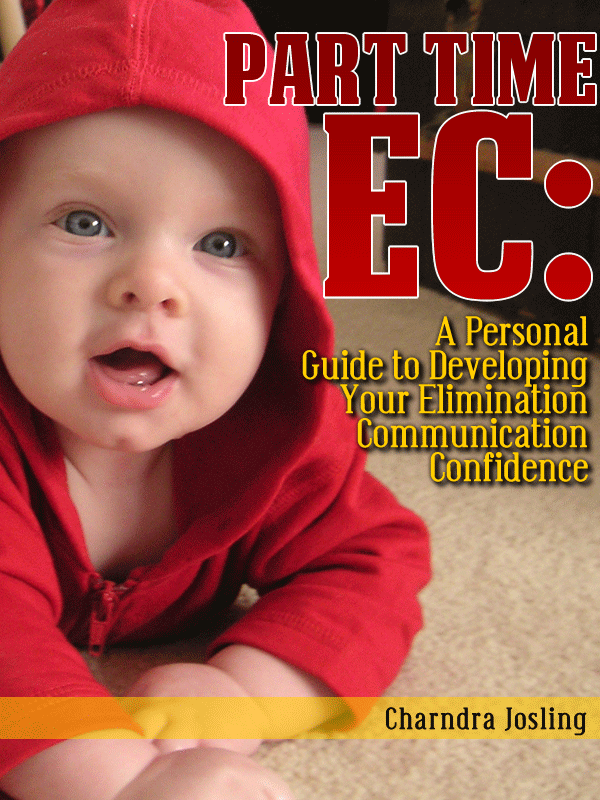Adventures in Elimination Communication: Charlie, Joy, Keegan and Liam in Ohio, USA.
Adventures in Part Time Baby Pottying: Charlie, Joy, Keegan and Liam in Ohio, USA.
Discover Valuable Insights in The Stories of Parents Practicing EC! How do they combine their busy modern lives with being part time diaper free?
What can your learn from someone who has a similar story to yours?
My husband is a university administrator and I am a public school teacher/ administrator turned SAHM. We have one son, Keegan who is currently 19 months old and another due in a few weeks, we will call him Liam.
1.When did you begin practising elimination communication with your little one and how did this look?
I was first made aware of babies not relying on diapers when traveling in Kenya, Africa the year before Keegan was born. I was intrigued but I never thought it would work in my culture and my busy life. When Keegan was about 4 months old I saw an article in the newspaper about elimination communication and other parents experiences. It explained how to hold a baby over the potty and cue them. So I tried it with Keegan. He pooped in the potty the first time I held him over it.
In the first few days I would potty him with each diaper change and upon waking and we starting catching pees and poos. It was great to make a catch and he seemed to enjoy it. I searched the web and read everything I could get my hands on about EC. I then began watching closely for his signs and giving more “pottytunities”. Within a few weeks we were catching all poo and many pees each day, but he was still in diapers most of the time.
2. Which diapers and alternatives did you use in the process?
We had used disposables with him since birth and we continued to do so most of the time, until he was about 17 months old, then we switched to training pants at home and cloth diapers for trips and bedtime.
When he was 8 months old I became a SAHM and had more time with him so I would give him some diaper free time to observe his cues for a little while each day (just a half an hour or hour here and there when we were home). As he became more mobile, I did a little less diaper free time because I was getting stressed about cleaning up misses.
Remember it is still Elimination Communication if you use diapers and give pottytunities. At this time we were catching all the poo so it was great to not have to change dirty diapers. I gave a lot of potty breaks and would use the ASL sign for restroom and the Psst cue every time I took him potty. I became more and more confident with diaper free time with each pee catch.
3. What differences/changes did you notice in your baby after beginning elimination communication?
He was very content going potty and was generally a very happy boy. He began signing potty at about 10 months old and I would take him. He was always so proud of himself and so smiley with every catch. I loved that I was helping him not soil himself. He seemed to feel great about it.
4. What difference did it make to your day-to-day life and your relationship with your baby?
I felt closer to him and more in- tune with what he needed and how to read his cues. His daddy came home from work one day and said, “You just understand him and what he needs so well. You read him like a book.” That was a highlight for me. It was great to hear that feedback. Now Daddy also understands his cues more & more each day. We both feel like we can meet his needs without a lot of crying or fussing. Other people have commented on how happy he is too.
Important note: I do try to inform the occasional caregiver what his cues and signs are so that he is not frustrated when trying to communicate with them. At 18 months old he was using 38 ASL signs consistently so caregivers were noticing that he would get frustrated if they did not understand his signs, even beyond “potty”.
I always made sure they knew Potty and would take him potty often so that cut down on some of the frustration. I also left a list of other common signs that he used so that they could ask him, “Show me the sign for Daddy” or whatever they thought he might be signing and try to figure out what he was saying. One sitter said it was like playing charades!
5. How long before you were feeling confident including a few ‘baby potty breaks’ into your day?
Right away. It just felt natural to give him opportunities every time the diaper was off for a change or if it had been a while since he went, I would just take him often. I took him potty often from 4 months on. As time went on, I was able to rely more on his cues and less on timing.
One unique struggle: We struggled a few times with public bathrooms that have automatic flush systems because the toilet would often flush while I was holding him over it and that scared him. So I began to show him how the flush would work and let him see it and watch the water go down a few times and he got used to it quickly. Now he actually tries to make it flush and I have to encourage him to wait until he has gone pee to make it flush. Every time we go into our favorite stories he signs potty and he usually goes just to make the toilet flush. Another friend suggested covering the sensor with a burp rag so that it doesn’t flush while he is on or held over the toilet.
6. In really busy times, what do you do?
Remember to take deep breaths. Don’t stress about misses and don’t be afraid to use a diaper if you find yourself stressing. Stress is worse than the misses and the diaper.
I used disposables most of the time when we first started. Now I use cloth because I found that we were having so many catches that I would have to throw out dry disposables when the tabs would not refasten. After about 4 potty breaks the tabs do not stay closed. I felt like I was wasting money, so now he is in underwear at home and in cloth when we are out and about. If I know that I have a super busy day and I may not be as attentive as I need to be to catch everything, I would use a back up cloth diaper so I was not always cleaning up messes. But he quickly got to a point where he would tell me he needed to go even when in a diaper.
At 18 months he was catching about 90% of pee and all poo. He still needs help pulling down and up his pants so I would not say he is toileting independently, but if we are doing bare bum time, then he will go all by himself on his little potty chair. He loves it! He is so proud to show me when he has gone all by himself.
7. What impact has reducing nappies had on your budget?
I have not calculated the figures, but we have not purchased nappies for a couple of months now. With the switch to cloth for some backup we are going to save a bunch. We made an initial investment in cloth, but we are loving them. We do still use disposables for nighttime because he is a very heavy nighttime wetter and I have not yet found a cloth set up that works for him at night. I am still working on that. I will use nearly all cloth and EC from birth with Liam.
8.What else has been significant to you?
I have had to have some thick skin and take other’s opinions and comment with a grain of salt. A lot of people don’t understand and therefore make some judgmental comments. I hear things like: “He is too young to go potty”, “ He is not ready for toileting” and many others. I usually just say something like, “It seems to be working for us and helps us save diapers and money.“ Once I said, “Would you like to come over and change all of his dirty diapers?” and that shut- up the objection really quickly.
I do try to respond with kindness and explain briefly what I have learned and why we do it. Some people want to hear more, others try to argue and I have decided that there is a time or place to discuss it if they want to talk more about it, but a lot of the time I just agree to disagree and move on. Defending the practice to a total stranger in a public restroom is not always a good idea.
I have however, taken a lot of time to explain it to caregivers, family, and good friends who want to know more.
Another significant thing is that my son has never had diaper rash! That alone is worth it!!!
9. What message do you have to share with parents beginning their part time elimination communication journey?
A FEW HINTS:
- Take time to enjoy your children. Use potty time to connect, sing songs, read books, and even look at pictures on the cell phone. Make potty time fun.
- If you find you are getting stressed about misses, take a break and use a back up. Try not to let you child see frustration with misses. You don’t want to make them feel bad for a natural function.
- Surround yourself with people who are supportive and encouraging, even if that is an online group.
- Avoid those who criticize or put down the practice, or discuss with them so they at least agree to disagree and not comment.
- Do what is best for you and your baby.
- Encourage those who care for your child to try potty breaks and show them what works for you. If they are willing, it is a great bonding opportunity for them and your baby too.
10. How would you practise elimination communication with another baby?
With our second coming in a few weeks. I plan to start elimination communication from the beginning. I have read all I can get my hands on to prepare for EC with a newborn. “Diaper Free Baby” was very helpful. I have joined a online Yahoo group to have support as I will be ECing a toddler and a newborn. I will also use cloth diapers for back up and travel from the beginning to save money and be more kind to the earth.
I will also carry/wear the second a lot more than I did the first so I can be more in tune with his cues.
– Joy.
Back to Adventures in Elimination Communication List of Stories…
My Free eBook: Build Your EC Confidence With Ease! Download my FREE eBook: The 7 Secrets to Elimination Communication (This is a popular EC resource: Over 2500 people have discovered Elimination Communication through ‘The 7 Secrets’)
Purchase your own copy of my popular, resource-packed eBook ‘Part Time EC: A Personal Guide to Developing Your Elimination Communication Confidence’ for just $2.99.






